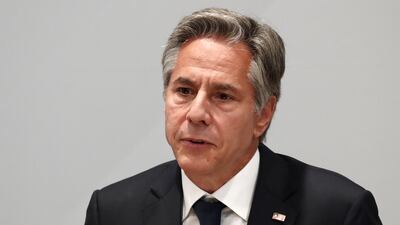A new nuclear deal between the US and Iran is “unlikely” any time soon, US Secretary of State Antony Blinken has said.
He said Tehran's response to an EU proposal on the deal was “clearly a step backward”.
This week, Germany, France and the UK raised “serious doubts” about Iran's sincerity in restoring the 2015 accord, from which Donald Trump, US president at the time, unilaterally withdrew in 2018 and reimposed sanctions on Iran.
“What we have seen over the last week or so in Iran’s response to the proposal put forward by the European Union is clearly a step backward and makes prospects for an agreement in the near-term, I would say, unlikely,” Mr Blinken said at a press conference in Mexico City.
“Iran seems either unwilling or unable to do what is necessary to reach an agreement and they continue to try to introduce extraneous issues to the negotiations that make an agreement less likely.”
The EU proposal was introduced to try to break a deadlock after months of indirect talks between the US and Iran.
An inquiry by the International Atomic Energy Agency (IAEA) into Iran’s past nuclear activities has taken centre stage in the talks to resuscitate the 2015 agreement, where success could unleash a surge in Iranian oil exports.
The agency's 35-member board of governors convened on Monday in Vienna to discuss the stand-off and heard a gloomy assessment from director general Rafael Grossi
“The information gap is bigger and bigger,” Mr Grossi said. However, he expects Iran to co-operate with his inquiry.
Iran's nuclear programme — in pictures
Iran is demanding the agency's investigation into suggestions of nuclear activities at undeclared sites be halted before it starts to dismantle a programme now enriching uranium to slightly below the levels needed to make weapons.
The US and other world powers have offered sanctions relief if Iran curtails nuclear-fuel production, but they insist it is up to the agency to declare an end to the investigation.
The governments of France, Germany and the UK issued a joint statement on Saturday addressing the latest demands from Iran.
“In light of Iran’s failure to conclude the agreement on the table, we will consult with our international partners on how best to deal with Iran’s continued nuclear escalation,” the European governments said.
European countries staying 'patient'
On Monday, German Chancellor Olaf Scholz said there was no reason for Iran not to sign the nuclear deal and that European countries would remain "patient".
But Mr Scholz admitted he did not expect an agreement in the immediate future.
He spoke after meeting Israeli Prime Minister Yair Lapid in Berlin. Mr Lapid insisted that restoring the 2015 agreement would be “a critical mistake".
Israel, which encouraged the US to withdraw from the nuclear deal in 2018, has opposed a renewed agreement between Iran and the world powers.
It says lifting sanctions will allow Iran to funnel billions of dollars to hostile militant groups and says an improved deal must also address Iran’s regional military activities and support for hostile groups such as Hezbollah in Lebanon and other militias in Syria.
Israeli Defence Minister Benny Gantz on Monday said Iran had built at least 10 plants “for mid- and long-range, precise missiles and weapons” in neighbouring Syria, including one reportedly hit by Israel in a recent air strike.
Mr Gantz told the Jerusalem Post Conference in New York that Iran has produced “more and more advanced centrifuges, including at underground facilities where activities are prohibited”, and called for Tehran to be held accountable.
His remarks could not be independently verified.










